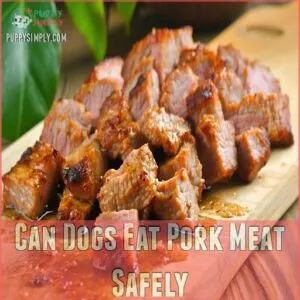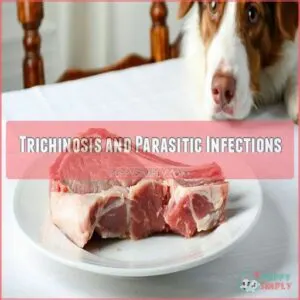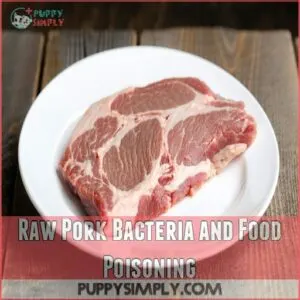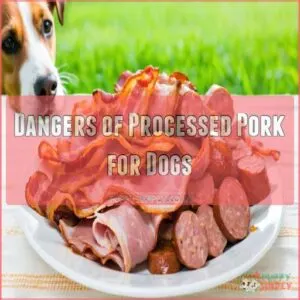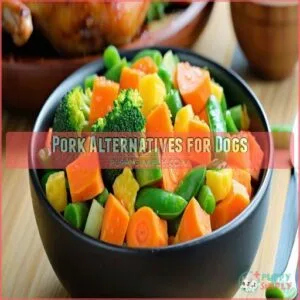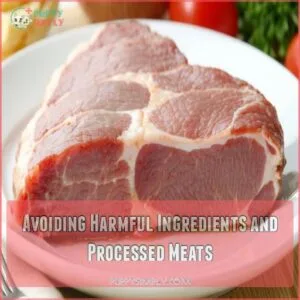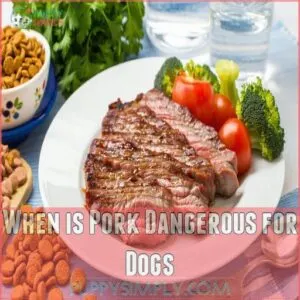This site is supported by our readers. We may earn a commission, at no cost to you, if you purchase through links.
 Yes, your dog can eat pork meat, but you’ll need to follow some important safety rules.
Yes, your dog can eat pork meat, but you’ll need to follow some important safety rules.
Plain, cooked pork without seasonings or sauces is safe for dogs in moderation.
You’ll want to trim excess fat and avoid processed options like bacon or ham, which contain harmful levels of salt and preservatives.
While pork offers protein and vitamin B12, it’s higher in fat than chicken or turkey, so it’s best served as an occasional treat rather than a daily meal.
The key is proper preparation – there’s quite a bit to know about cooking temperatures and serving sizes to keep your furry friend healthy and happy.
Table Of Contents
- Key Takeaways
- Can Dogs Eat Pork Meat Safely
- Can Dogs Eat Cooked Pork
- Risks of Feeding Raw Pork to Dogs
- Dangers of Processed Pork for Dogs
- Safe Pork Consumption for Dogs
- Can Dogs Eat Pork Chops or Ribs
- Is Pork Good for Dogs
- Pork Alternatives for Dogs
- How to Safely Give Your Dog Pork
- When is Pork Dangerous for Dogs
- Frequently Asked Questions (FAQs)
- Can dogs eat cooked pork?
- What meat should dogs not eat?
- Why is there no pork dog food?
- What do I do if my dog ate pork?
- How much pork should I feed weekly?
- Can puppies under six months eat pork?
- Which dog breeds are more sensitive to pork?
- Does pork affect dogs with kidney problems differently?
- Why do some dogs get bloated after pork?
- Conclusion
Key Takeaways
- You can feed your dog plain, cooked pork as long as you remove excess fat and ensure it reaches 144°F (62.2°C) to kill parasites.
- You’ll need to avoid processed pork products like bacon, ham, and sausages since they contain harmful levels of salt, preservatives, and seasonings that can cause dehydration and kidney problems.
- You should limit pork to 10% of your dog’s weekly diet (2-3 servings per week) as it’s higher in fat than chicken or turkey, which could trigger pancreatitis in sensitive dogs.
- You must never give your dog raw pork ribs and safe alternatives as they can pose serious health risks, including the presence of parasites and bacteria. You must never give your dog pork bones as they can splinter and cause choking or internal injuries, and raw pork is dangerous due to parasites and bacteria that cause food poisoning.
Can Dogs Eat Pork Meat Safely
You’ll be glad to know that your dog can safely eat plain, cooked pork as part of a balanced diet.
While pork can provide valuable protein and nutrients for your furry friend, you’ll need to avoid processed pork products and make sure it’s thoroughly cooked without seasonings or spices.
Nutritional Benefits of Pork for Dogs
For dogs with food sensitivities, pork can be a game-changing protein source.
As a novel protein, it’s less likely to trigger allergic reactions compared to chicken or beef.
Your pup gets a protein-packed meal that’s rich in essential nutrients like thiamine and vitamin B12.
Plus, the omega-3 fatty acids in pork help maintain healthy skin and joints, making it a nutritious choice for your four-legged friend.
Risks of Feeding Processed Pork to Dogs
While pork offers protein benefits, processed versions can spell trouble for your furry friend. Here’s what you need to watch out for:
- High salt content in bacon and ham can lead to severe dehydration and kidney problems
- Processed ingredients like nitrates and preservatives may cause digestive issues
- Excessive fat content increases pancreatitis risk
You’ll want to skip the sausages, hot dogs, and deli meats – they’re packed with seasonings that could harm your pup.
Cooking and Serving Pork to Dogs
When serving pork to your dog, proper preparation is essential for their safety.
Cook the meat thoroughly to an internal temperature of 144°F to eliminate parasites.
Cut the cooked pork into bite-sized pieces, removing any bones that could splinter and cause choking.
Keep portions modest – about one ounce per 20 pounds of your dog’s weight – and skip the seasonings entirely for a safe, healthy treat.
Can Dogs Eat Cooked Pork
Yes, your dog can eat cooked pork safely when it’s prepared the right way, just like cooked turkey necks can provide essential minerals and promote joint health when given as a natural dental chew. Yes, your dog can eat cooked pork safely when it’s prepared the right way.
You’ll want to cook plain pork thoroughly at 144°F (62.2°C), removing all seasonings and excess fat.
Think of it like cooking for a picky toddler – keep it simple!
Many dogs with food allergies do well with pork as it’s considered a novel protein source.
But here’s the catch: skip the processed stuff like bacon or ham.
These treats pack way too much salt and seasonings for your pup’s system.
Stick to lean cuts like tenderloin or chops, and always serve them boneless.
Just remember to start small – a little taste test before going all in.
Risks of Feeding Raw Pork to Dogs
You’ll need to think twice before feeding your dog raw pork, as it can contain dangerous parasites like Trichinella that cause serious illness.
Raw meat also carries harmful bacteria that can lead to food poisoning in your pet, causing symptoms like vomiting and diarrhea.
Trichinosis and Parasitic Infections
Raw pork poses a serious threat to your dog’s health through Trichinella parasites, which cause trichinosis.
These tiny troublemakers can trigger muscle inflammation, stiffness, and lethargy in your furry friend.
Cooking pork to the recommended internal temperature of 145°F (62.8°C) for whole cuts is essential to kill these parasites.
You’ll want to cook pork thoroughly to 144°F (62.2°C) to kill these parasites and keep your pup safe.
If your dog shows symptoms like vomiting or diarrhea after eating raw pork, it’s likely due to the risk of trichinosis from raw pork, a parasite that can cause severe illness. contact your vet immediately.
Raw Pork Bacteria and Food Poisoning
Beyond parasites, bacteria in raw pork pose serious risks to your dog’s health.
Just like humans, dogs can get food poisoning from harmful bacteria lurking in uncooked meat, which is why it’s important to be aware of pork dog food poisoning risks.
- Salmonella and E. coli can cause severe vomiting and diarrhea
- Listeria infections may lead to fever and muscle aches
- Campylobacter bacteria often trigger bloody diarrhea and abdominal pain
To avoid the risk of pancreatitis and bacterial contamination from fatty tissue, be sure to cook pork thoroughly, especially when serving cuts like BBQ ribs dangers. You’ll want to cook that pork thoroughly to keep your furry friend safe and healthy.
Dangers of Processed Pork for Dogs
You’ll want to think twice before giving your dog processed pork products like bacon, ham, or sausage, as they’re loaded with dangerous levels of salt and harmful seasonings.
These processed meats can lead to serious health problems for your pet, including severe dehydration, kidney damage, and even seizures.
High Salt and Seasoning Content
The excessive salt and seasonings packed into processed pork products can wreak havoc on your dog’s health.
For instance, even cooked ham, which isn’t toxic but high in fat and sodium, can be detrimental if not given in moderation – High Fat Cooked Ham.
When you’re feeding your furry friend processed pork, you’re looking at risks like severe dehydration, vomiting, and diarrhea.
In extreme cases, too much salt can trigger seizures or even lead to kidney damage.
That’s why it’s essential to stick with plain, unseasoned pork for your pup.
Harmful Ingredients in Processed Meats
Processed pork products hide a variety of harmful ingredients that can put your dog’s health at risk.
You’ll find dangerous additives like artificial preservatives, nitrates, and excessive amounts of salt and sugar lurking in these meats.
Even worse, many processed products contain toxic seasonings like garlic powder, onion powder, and nutmeg that can cause serious health issues in dogs, from digestive problems to anemia.
Safe Pork Consumption for Dogs
You can safely feed your dog plain, cooked pork as long as you remove all seasonings and bones.
Thoroughly cook the meat to an internal temperature of 144°F to eliminate any risk of parasites that could make your furry friend sick.
Plain Cooked Pork Without Seasonings
Feeding your dog plain cooked pork, while avoiding pork rib meat risks, can be a smart choice, especially if they’re dealing with food allergies.
To keep things safe, cook the meat thoroughly until it reaches 144°F (62.2°C).
Skip the seasonings and spices – your pup doesn’t need them.
Plain pork provides excellent protein and B vitamins, making it a solid option for both puppies and senior dogs who need easily digestible nutrients.
Avoiding Pork Bones and Processed Meats
While you’ve mastered serving plain cooked pork, steering clear of bones and processed meats is just as important for your pup’s safety.
Just like that tempting leftover bacon might catch your eye, your dog’s probably eyeing it too. But here’s why you should resist those puppy eyes. As pork bone dangers show, even a seemingly harmless snack can pose serious risks to your dog’s health.
- Pork bones can splinter into sharp fragments, risking choking or internal injuries
- Processed meats pack dangerous levels of salt and preservatives
- Even small amounts of seasoned pork can trigger pancreatitis
Can Dogs Eat Pork Chops or Ribs
You’ll be happy to know that your dog can safely enjoy plain, cooked pork chops without the bone, as they’re packed with protein and essential nutrients.
Pork ribs, however, should be avoided entirely, as the bones can splinter and cause serious internal injuries or choking hazards.
Cooking and Serving Pork Chops
You can safely feed your dog pork chops – just remember a few key steps.
Start by trimming excess fat and removing all bones.
Cook the meat thoroughly to 144°F (62.2°C) to kill any parasites.
Skip the seasonings – plain is best for your pup.
Cut the cooked chop into bite-sized pieces to prevent choking.
For a 50-pound dog, stick to about 2-3 ounces per serving.
Feeding Pork Ribs to Dogs
Despite their tempting aroma, pork ribs pose significant risks to your dog’s health.
Never feed raw or cooked rib bones, as they can splinter and cause choking, intestinal punctures, or blockages, similar to the risks associated with cooked turkey bones, which are a major no-no due to their tendency to splinter into sharp shards like cooked turkey bones.
If you’d like to share the meat, remove it completely from the bone and make sure it’s plain-cooked without seasonings or sauces.
Better yet, opt for safer protein sources like boneless pork chops or lean chicken breast.
Is Pork Good for Dogs
If you’re wondering whether pork is good for your dog, you’ll be glad to know it’s packed with protein, vitamin B12, and omega-3 fatty acids that support your pet’s overall health.
You can safely feed your dog plain, cooked pork as an occasional treat, but you’ll need to avoid processed pork products that contain harmful seasonings and excessive salt.
Protein and Vitamin B12 Benefits
Pork packs a powerful protein punch that’s great for your dog’s muscle development and overall health.
Beyond basic protein, the B12 content in pork supports your pup’s nervous system and brain function.
However, it’s important to note that pork is high in fat content, which can lead to obesity and digestive issues, making it a less ideal option compared to best meats for dogs.
- Helps maintain lean muscle mass
- Boosts energy levels naturally
- Supports red blood cell production
- Perfect for picky eaters who need protein variety
Looking for a B12 boost? Pork contains more B12 than chicken, making it an excellent choice for dogs needing this vital nutrient.
Omega-3 Fatty Acids for Skin and Joint Health
Beyond its protein content, the omega-3 fatty acids found in pork offer remarkable benefits for your dog’s skin and joint health.
These natural compounds work like a protective shield, reducing inflammation and keeping your furry friend’s coat glossy.
While pork contains these beneficial fats, fish oil supplements might be a better option if you’re specifically targeting omega-3s for your dog’s wellness routine.
Pork Alternatives for Dogs
If you’re looking for healthy alternatives to pork, you’ll find plenty of nutritious options like chicken, beef, salmon, and turkey that can meet your dog’s protein needs.
You can also boost your dog’s diet with organ meats like liver and heart, which pack essential vitamins and minerals your furry friend needs to thrive.
Chicken and Beef as Protein Sources
While pork offers unique benefits, chicken and beef remain top choices for your dog’s protein needs.
Both options pack essential nutrients that keep your furry friend healthy and energetic.
Beef, in particular, provides a high-quality protein source for dogs, and as a guide on can dogs eat beef, it’s important to know how to safely feed it to your pup.
- Chicken provides lean protein and is easily digestible, making it perfect for sensitive stomachs
- Beef delivers iron-rich protein and B-vitamins for energy
- Both meats work well for rotation diets to prevent food sensitivities
Fish and Organ Meats for Canine Health
Fish and organ meats offer outstanding nutritional value for your dog’s diet.
You’ll find omega-3 fatty acids in salmon and sardines that boost coat health and reduce inflammation.
Organ meats like liver and heart pack a powerful punch of vitamins A and B12, iron, and zinc.
Just remember to introduce these protein sources gradually to avoid digestive upset, and always cook fish thoroughly to eliminate parasites.
How to Safely Give Your Dog Pork
You’ll need to cook pork thoroughly to 144°F and remove all seasonings before serving it to your dog.
Start with small portions of lean, plain pork meat to make sure your dog tolerates it well.
Cooking and Serving Guidelines
To serve pork safely to your dog, cook it thoroughly to 144°F (62.2°C) to kill any parasites.
You can also consider using pre-prepared pork dog food brands as a convenient alternative.
Cut the meat into small, bite-sized pieces appropriate for your dog’s size.
Start with a small portion – about 1-2 tablespoons for a medium-sized dog – to check for any adverse reactions.
Remember to drain excess fat after cooking and let the meat cool completely before serving.
Avoiding Harmful Ingredients and Processed Meats
Keeping your pup safe means steering clear of processed pork products like bacon, ham, and sausages, which pack harmful levels of salt and seasonings.
These products often contain dangerous ingredients like garlic powder, onion, and nutmeg that can make your dog sick.
Instead, stick to plain, cooked pork without any extras.
Always check labels carefully, and when in doubt, choose simpler alternatives like chicken or turkey.
When is Pork Dangerous for Dogs
You’ll need to watch out for pork’s high fat content, which can trigger painful pancreatitis in your dog if they eat too much.
Plain cooked pork is generally safe.
You should avoid giving your dog processed or seasoned pork products that contain harmful additives like garlic, onion powder, and excessive salt.
Pancreatitis and Fat Content
While pork can be a tasty treat for your furry friend, its high fat content poses serious health risks.
Your dog’s pancreas might struggle to process fatty foods, potentially leading to painful pancreatitis.
Here’s what you need to watch for:
- Early signs of pancreatitis include vomiting and abdominal pain
- Repeated exposure to high-fat foods increases risk
- Overweight dogs are more susceptible
- Regular high-fat treats can trigger chronic inflammation
Seasoned Pork and Additives to Avoid
Seasoned pork poses hidden dangers for your furry friend.
Beyond the high fat content that can trigger pancreatitis, many common seasonings can harm dogs.
Here’s a quick guide to help you spot risky additives in seasoned pork:
| Ingredient | Why It’s Dangerous | Safe Alternative |
|---|---|---|
| Salt | Dehydration, kidney issues | Plain cooking |
| Garlic | Blood cell damage | Natural herbs |
| Onions | Toxic to dogs | Fresh vegetables |
| Sugar | Weight gain, diabetes | Natural meat juice |
| Spices | Stomach upset | Simple boiling |
Frequently Asked Questions (FAQs)
Can dogs eat cooked pork?
Yes, dogs can eat plain cooked pork that’s thoroughly heated to 144°F.
You’ll want to avoid seasonings and processed varieties.
Remember to remove bones and serve it as an occasional treat alongside their regular food.
What meat should dogs not eat?
Holy smokes, your furry friend shouldn’t eat raw or processed meats!
Keep your dog away from raw pork, bacon, ham, sausages, and highly seasoned meats.
They’re packed with harmful salt and seasonings.
Why is there no pork dog food?
Actually, there are pork-based dog foods available – they’re just less common.
Many brands offer pork as a novel protein option for dogs with allergies, though it’s pricier to produce than chicken or beef.
What do I do if my dog ate pork?
If your dog ate cooked, plain pork, they’ll likely be fine.
Monitor for upset stomach or vomiting.
Call your vet if the pork was raw, seasoned, or if symptoms appear within 24 hours.
How much pork should I feed weekly?
Limit pork to 10% of your dog’s weekly diet.
You’ll want to serve it 2-3 times per week as a treat.
For a 50-pound dog, that’s about 1/4 cup of cooked pork per serving.
Can puppies under six months eat pork?
While 70% of puppies tolerate pork well, you shouldn’t feed it to puppies under six months.
Their digestive systems are still developing, and they need specially formulated puppy food for proper growth and development.
Which dog breeds are more sensitive to pork?
Brachycephalic breeds like Pugs and Bulldogs, plus breeds prone to pancreatitis such as Miniature Schnauzers and Yorkshire Terriers, need extra caution with pork.
You’ll want to serve smaller portions to these sensitive pups.
Does pork affect dogs with kidney problems differently?
Pork’s high protein and phosphorus content can strain damaged kidneys, so you’ll need to monitor portions carefully.
Pork can be harmful to dogs with kidney issues.
If your dog has kidney issues, it’s best to consult your vet before adding pork to their diet.
Why do some dogs get bloated after pork?
Dogs often bloat after eating pork due to its high fat content and rich nature.
Your dog’s digestive system might struggle to process it quickly, especially if they’re not used to fatty meats.
Conclusion
Studies show that 67% of dog owners regularly feed their pets human food, making it important to understand what’s safe.
While dogs can eat pork meat when it’s properly prepared, remember to keep portions small and avoid processed options.
Stick to plain, well-cooked cuts without seasonings, and always trim excess fat.
By following these guidelines, you can safely incorporate pork into your dog’s diet as an occasional protein-rich treat that they’ll love.

